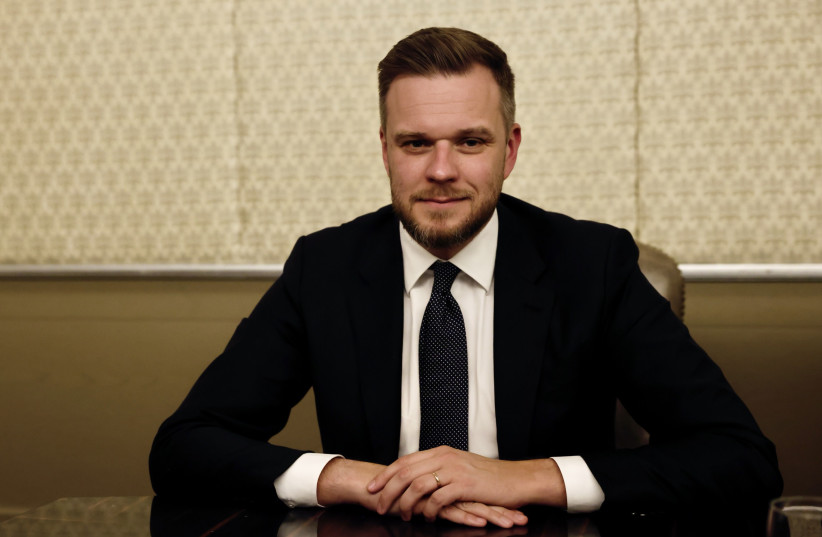Israel should help secure the future of Eastern Europe by giving Ukraine defensive weapons to help it withstand the Russian invasion of its country, Lithuanian Foreign Minister Gabrielius Landsbergis told The Jerusalem Post on Thursday.
“We consider the war against Ukraine our main strategic security issue. That means that assisting Ukraine to win this war is what we consider the main benefit to our security,” he said as he sat in a conference room at Jerusalem’s Waldorf Astoria and reflected on the danger Russia posed to his region.
He raised the issue during his meetings with Israeli officials, including his counterpart Eli Cohen, who visited Kyiv last month. Prime Minister Benjamin Netanyahu and Cohen have strengthened Israel’s support of Ukraine, under pressure from the United States and Western allies, including countries like Lithuania.
Cohen was careful to mention his Kyiv trip when he met earlier this week with his German counterpart, Annalena Baerbock.
Landsbergis lauded Cohen’s trip, stating that it was a “very good, very smart step.” Cohen announced economic and humanitarian support, Landsbergis said, but the question is can Jerusalem “expand that support? We would very much applaud if it is expanded.”

Ukraine has pushed Israel to provide it with anti-drone and anti-missile systems, particularly given that Russia is using armed Iranian drones against it.
Russia has warned Israel that the provision of such air-defense systems would be a redline. For security reasons, Jerusalem has sought to maintain its ties with Moscow and has sought other means to help Kyiv.
But its Western allies, such as Lithuania, do not believe it can remain on the fence.
“We think it is impossible not to choose a side in this,” said Landsbergis, who this week made his first official trip to Israel since taking office at the end of 2020.
He pointed to Moscow’s military ties with Iran as one of the strong reasons why Israel should send Ukraine an air-defense system.
“The Iranian drones is for me the main argument,” he said, adding that Israel has “been under threat from the same technology that is actively being used on a daily basis against Ukrainian civilian infrastructure.
“I would consider Israel the best-prepared country” when it comes to knowing “how to deal with those threats. I consider it in our... bilateral benefit if we collaborate on this,” he said.
During his meeting with Cohen, Landsbergis reiterated his country’s support for the designation of the Islamic Revolutionary Guard Corps as a terrorist entity but noted that Vilnius would have to wait for the European Union to support such a step before it would move forward on the matter.
Part of its strong stance on Iran, he said, is a result of the new security understanding brought about by Russia’s war on Ukraine, a situation that Israel cannot afford to be neutral about.
Anything that can help Ukraine win this war and defend its cities and civilians should be given to them, he said.
Europe is increasingly seeing the “world through the lens of the war in Ukraine because it affects each and every one of us,” Lithuania’s foreign minister said.
Concerns over Israel's internal chaos
He arrived in Israel during a tumultuous week, when the government advanced its judicial overhaul plan, even though Western allies have expressed concern that it would weaken Israeli democracy.
Netanyahu has said it would strengthen it, but his allies have not been convinced.
Landsbergis said he expressed to Cohen and to President Isaac Herzog the concern felt by EU countries and his own.
“There is a concern in Europe” and there “are worried voices in Lithuania as well,” he said, adding that “I delivered the message.”
At issue in particular is the concern about the continued separation of powers and the protection of minority rights.
Landsbergis also said he was worried about the rising Israeli-Palestinian violence, during a week in which three Israelis were killed in two terror attacks and Jewish vigilantes went on a rampage and burned dozens of homes and vehicles in the Palestinian town of Huwara, during which a Palestinian man was killed.
“We call for de-escalation” and the resumption of Israeli-Palestinian negotiations, he said.
“Our added worry that I also transmitted through the meetings here is that we are, I believe, in quite an unstable geopolitical time that affects not just Lithuania. So I think the wise path is to lower the tensions,” he said.
“The time might come when we need each other,” he said, adding that Lithuania needs Israel to help Ukraine, and Israel needs Lithuania to provide it with political support.
Political partnerships are more important now than ever, Landsbergis said.
